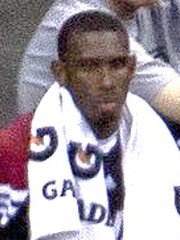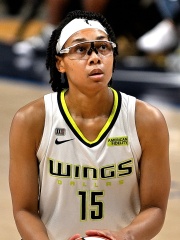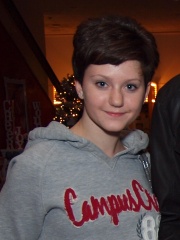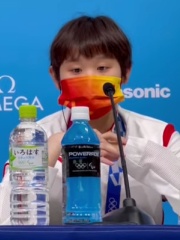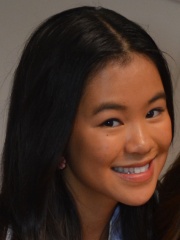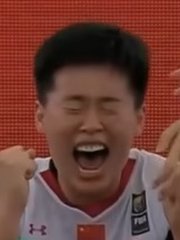BASKETBALL PLAYER
Wang Siyu
1995 - Today

 Wang Siyu
Wang Siyu
Wang Siyu (Chinese: 王思雨; pinyin: Wáng Sīyǔ, born 16 October 1995) is a Chinese basketball player. Active since 2013, She represented China at the 2018, and 2022 FIBA Women's Basketball World Cup, where her game at the semifinals against hosts Australia was crucial to reach the finals. Read more on Wikipedia
Her biography is available in 8 different languages on Wikipedia. Wang Siyu is the 2,142nd most popular basketball player (down from 1,833rd in 2024), the 1,939th most popular biography from China (down from 1,726th in 2019) and the 17th most popular Chinese Basketball Player.
Memorability Metrics
Page views of Wang Siyu by language
Among BASKETBALL PLAYERS
Among basketball players, Wang Siyu ranks 2,142 out of 1,757. Before her are Stefanie Dolson, Keita Bates-Diop, Jared McCain, Huang Sijing, Miye Oni, and Marquis Teague. After her are Chris Goulding, Cameron Brink, Cleanthony Early, Alix Duchet, Terrel Harris, and Allisha Gray.
Most Popular Basketball Players in Wikipedia
Go to all RankingsStefanie Dolson
1992 - Present
HPI: 26.14
Rank: 2,136
Keita Bates-Diop
1996 - Present
HPI: 26.08
Rank: 2,137
Jared McCain
2004 - Present
HPI: 26.06
Rank: 2,138
Huang Sijing
1996 - Present
HPI: 26.05
Rank: 2,139
Miye Oni
1997 - Present
HPI: 26.05
Rank: 2,140
Marquis Teague
1993 - Present
HPI: 25.82
Rank: 2,141
Wang Siyu
1995 - Present
HPI: 25.81
Rank: 2,142
Chris Goulding
1988 - Present
HPI: 25.68
Rank: 2,143
Cameron Brink
2001 - Present
HPI: 25.67
Rank: 2,144
Cleanthony Early
1991 - Present
HPI: 25.65
Rank: 2,145
Alix Duchet
1997 - Present
HPI: 25.59
Rank: 2,146
Terrel Harris
1987 - Present
HPI: 25.56
Rank: 2,147
Allisha Gray
1995 - Present
HPI: 25.51
Rank: 2,148
Contemporaries
Among people born in 1995, Wang Siyu ranks 1,497. Before her are Iuliana Buhuș, Oskar Marvik, Robin Hendrix, Benjamin Gischard, Lukas Windfeder, and Jordan Todosey. After her are Alanna Kennedy, María José Granatto, Christian Baumann, P. U. Chitra, Ou Zixia, and Perris Benegas.
Others Born in 1995
Go to all RankingsIuliana Buhuș
ATHLETE
1995 - Present
HPI: 26.06
Rank: 1,491
Oskar Marvik
ATHLETE
1995 - Present
HPI: 26.06
Rank: 1,492
Robin Hendrix
ATHLETE
1995 - Present
HPI: 26.00
Rank: 1,493
Benjamin Gischard
GYMNAST
1995 - Present
HPI: 25.99
Rank: 1,494
Lukas Windfeder
ATHLETE
1995 - Present
HPI: 25.92
Rank: 1,495
Jordan Todosey
ACTOR
1995 - Present
HPI: 25.86
Rank: 1,496
Wang Siyu
BASKETBALL PLAYER
1995 - Present
HPI: 25.81
Rank: 1,497
Alanna Kennedy
SOCCER PLAYER
1995 - Present
HPI: 25.76
Rank: 1,498
María José Granatto
ATHLETE
1995 - Present
HPI: 25.74
Rank: 1,499
Christian Baumann
GYMNAST
1995 - Present
HPI: 25.74
Rank: 1,500
P. U. Chitra
ATHLETE
1995 - Present
HPI: 25.71
Rank: 1,501
Ou Zixia
ATHLETE
1995 - Present
HPI: 25.71
Rank: 1,502
Perris Benegas
ATHLETE
1995 - Present
HPI: 25.71
Rank: 1,503
In China
Among people born in China, Wang Siyu ranks 1,939 out of 1,610. Before her are Fan Yilin (1999), Yu Hexin (1996), Zhang Jiaqi (2004), Huang Sijing (1996), Niu Guannan (1992), and Su Weide (2000). After her are Ai Yanhan (2002), Ou Zixia (1995), Yang Zhe (1991), Peng Shimeng (1998), Tiffany Espensen (1999), and Ji Xinjie (1997).
Others born in China
Go to all RankingsFan Yilin
GYMNAST
1999 - Present
HPI: 26.22
Rank: 1,933
Yu Hexin
SWIMMER
1996 - Present
HPI: 26.22
Rank: 1,934
Zhang Jiaqi
ATHLETE
2004 - Present
HPI: 26.17
Rank: 1,935
Huang Sijing
BASKETBALL PLAYER
1996 - Present
HPI: 26.05
Rank: 1,936
Niu Guannan
ATHLETE
1992 - Present
HPI: 25.98
Rank: 1,937
Su Weide
GYMNAST
2000 - Present
HPI: 25.86
Rank: 1,938
Wang Siyu
BASKETBALL PLAYER
1995 - Present
HPI: 25.81
Rank: 1,939
Ai Yanhan
SWIMMER
2002 - Present
HPI: 25.74
Rank: 1,940
Ou Zixia
ATHLETE
1995 - Present
HPI: 25.71
Rank: 1,941
Yang Zhe
ATHLETE
1991 - Present
HPI: 25.70
Rank: 1,942
Peng Shimeng
SOCCER PLAYER
1998 - Present
HPI: 25.57
Rank: 1,943
Tiffany Espensen
ACTOR
1999 - Present
HPI: 25.51
Rank: 1,944
Ji Xinjie
SWIMMER
1997 - Present
HPI: 25.38
Rank: 1,945
Among BASKETBALL PLAYERS In China
Among basketball players born in China, Wang Siyu ranks 17. Before her are Hu Jinqiu (1997), Yang Shuyu (2002), Sun Mengran (1992), Shao Ting (1989), Li Yueru (1999), and Huang Sijing (1996). After her are Wu Tongtong (1994), Pan Zhenqi (1995), and Zhang Ru (1999).
Hu Jinqiu
1997 - Present
HPI: 30.99
Rank: 11
Yang Shuyu
2002 - Present
HPI: 30.01
Rank: 12
Sun Mengran
1992 - Present
HPI: 29.70
Rank: 13
Shao Ting
1989 - Present
HPI: 28.93
Rank: 14
Li Yueru
1999 - Present
HPI: 27.25
Rank: 15
Huang Sijing
1996 - Present
HPI: 26.05
Rank: 16
Wang Siyu
1995 - Present
HPI: 25.81
Rank: 17
Wu Tongtong
1994 - Present
HPI: 23.12
Rank: 18
Pan Zhenqi
1995 - Present
HPI: 21.72
Rank: 19
Zhang Ru
1999 - Present
HPI: 20.95
Rank: 20










